-
The Future
-
AX(AI Transformation)
AX(AI Transformation)While many technological innovations have transformed enterprise work environments, none have brought change as profound as artificial intelligence (AI). In today’s business landscape, AI is no longer just another technology, it has become a driving force behind fundamental business transformation. In a future shaped by agentic AI and AX, only companies that work with partners offering visionary leadership and innovative technologies will secure lasting competitiveness.
-
AX(AI Transformation)
-
Services
-
IT Infrastructure on Cloud
IT Infrastructure on CloudIT Infrastructure on Cloud strategy! Build a better business by leveraging all of these technologies.Cloud
- # Cloud Migration Roadmap
- # Multi-Cloud Enablement
- # Cloud-Native Adoption
- # AI Strategy on Cloud
- # Cloud Cost Optimization
Infrastructure- # Hybrid Cloud
- # Multi-Infrastructure Ops
- # AI Infrastructure Setup
- # Industry-Specific 5G
- # Flexible Infra Design
Data Center- # Data Center
- # DC Consulting Services
- # DC Deployment Considerations
- # DC Build & Operations
- # DC Total Lifecycle
Security- # Cybersecurity Consulting
- # Integrated Security Services
- # Custom Security Solutions
- # OT Security Implementation
- # Security Threat Management
-
AI
AIDiscover the most important driver of corporate innovation and the AI offering best suited to your business.Agentic AI
- # AgenticWorks
- # AI Orchestration
- # AI Partnership
- # AI Management
- # Integrated AI Services
AX Platform- # AX Platform Architecture
- # DAP GenAI Knowledge Lake
- # DAP GenAI Image/Text
- # DAP MLDL
- # DAP Vision
AX Consulting- # AI Strategy Consulting
- # Tailored AI
- # AI-Driven Process Innovation
- # AI Implementation Metrics
- # AI Governance
AICC- # AI Consultation Bot
- # Gen AI Consultation Service
- # Journey-Based Engagement
- # Cloud Contact Center
- # Contact Center Cost Saving
Virtual Factory- # Manufacturing Trends
- # Digital Twin Solutions
- # Digital Transformation
- # EPC Digital Transformation
- # CPM Deployment
-
Biz Data
Biz DataDeal with the fast-changing environment effectively with new business insights and a Gen AI Ready platform.
-
Biz Process Intelligence
Biz Process IntelligenceStart leading change by innovating how you work with more efficient and sustainable operations.Digital AX
- # Reinvent work with a:xink
- # Future of Work
- # AI-Driven Workplace Platform
- # Digital EX with AX
- # NEXT ITSM Solution
Sales & Customer Service Management- # AI Device Platform
- # AI Contact Center
- # Subscription Management
- # Converged MVNO Services
- # AI Product Management
Business Management- # AI Business Management
- # Business Mgmt Readiness
- # Equipment Efficiency
- # SPACE-N Solution
- # Business Support System
SCM- # SCM Strategy Planning
- # SCM Diagnosis Consulting
- # Demand-Driven Production
- # Supply Chain Planning
- # Vendor Management System
ESG- # Custom ESG Consulting
- # ESG Disclosure & Ratings
- # ESG Management Platform
- # Digital Safety System
- # Risk Monitoring Platform
-
Enterprise Solution
Enterprise SolutionTry out tech-focused business solutions that can improve every part of your work.ERP
- # Cloud ERP Migration
- # AI-Driven ERP PI
- # Next-Gen ERP
- # ERP Architecture
- # SAP ERP Operations
SINGLEX- # Global SCM Risk Control
- # HR Management Solution
- # AI for Manufacturing
- # AI Quality Management
- # AI-Driven CRM
Enteprise SW- # PerfecTwin Test Automation Solution
- # Web3 Adoption Strategy
- # Data-Driven Ad Operation
- # LENA Cloud Middleware Optimization
-
Customer Experience
Customer ExperienceProviding consistent and empathetic experiences throughout the customer journey with AI and data-driven personalized services.
-
Smart Factory
Smart FactoryExperience sustainable growth by applying AX to all manufacturing processes, including product development, process management, and production logistics.Manufacturing Execution Management
- # MES Data Integration
- # MMD Efficiency Enhancement
- # Expected MES Outcomes
- # Real-Time Process Monitoring
- # WMS Optimization Strategy
Process Management- # Recipe Management System
- # Productivity & Quality Boost
- # Quality Issue Management
- # Process Anomaly Detection
- # Real-Time Anomaly Alert
Production Logistics Management- # Smart Factory Logistics
- # Real-Time Dispatcher
- # Process Computerization
- # DAQ System
- # Digital Twin for Facilities
Product Development Management- # PLM Platform Adoption
- # Collaborative Dev Environment
- # Digital Design Platform
- # Optimized R&D Environment
- # Software-Defined Vehicle
-
Smart Logistics
Smart LogisticsDiscover smart logistics that evolve on their own through total solutions that cover the entire process from design to operation.
-
Smart City & Space
Smart City & SpaceExplore a new paradigm for future spaces that offer a better life, focusing on mobility and data.
-
Consulting
ConsultingConsulting services that drive customer innovation and growth, delivering tangible value.
-
Industry-Specific Services
Industry-Specific ServicesFinance
- # Card All-in-One Solution
- # Digital Banking
- # Custom Insurance Service
- # Advanced Insurance System
- # Tokenized Securities Platform
Education- # AI Language Education
- # AI Tutor Solution
- # EdTech Service Deployment
- # AI Digital Textbook
- # Personalized Learning Content
Public Services- # Mobile ID Service
- # Decentralized ID Use Case
- # E-Wallet Service
- # ID Verification Service
- # Mobile ID Fraud Prevention
Oil&Gas and Petrochemical- # AX Strategy
- # Digitalizing Manufacturing
- # Factory Operations Optimization
- # Industry-Specific AI Service
- # ESG Management
Pharmaceutical and Biotech- # Pharma/Bio AX Strategy
- # R&D Innovation
- # Digitalized Manufacturing
- # Smart Logistics Automation
- # AI Safety & Compliance
-
IT Infrastructure on Cloud
- The Future
-
Services
IT Infrastructure on CloudBiz DataBiz Process IntelligenceEnterprise SolutionCustomer ExperienceSmart FactorySmart LogisticsSmart City & SpaceConsultingIndustry-Specific Services
No search results found.
Industry-Specific Services
Public ServicesOnline identity verification methods that require users to submit personal information have become common when using online services. However, if personal data is leaked or misused, it can lead to serious social issues, making the control of personal information online a critical concern. Various technical and administrative functions and policies have been put in place to protect identity information, including personal data, but it is realistically impossible to achieve complete control.
Accordingly, it is crucial to recognize that individuals are the owners of their personal data and are responsible for its protection and management, and to actively take control and manage it. Recently, the concept of Self-Sovereign Identity (SSI) has been gaining attention, where individuals retain the authority to determine how their data is used and can selectively submit only the necessary information during identity verification.
Mobile devices, thanks to their portability and convenience, have become the primary channel for accessing many digital services. As a result, identity verification technologies have also evolved. While centralized online authentication methods were traditionally used for each individual service, certificate-based identity verification has become the most widely adopted method today. However, this method presents challenges such as excessive personal data retention by service providers or certification authorities, and the risk of large-scale data breaches in the event of hacking. To address these issues, blockchain-based Decentralized Identity (DID) technology is now being actively adopted.
A DID-based mobile ID is stored securely on a personal smartphone and offers convenient use, transforming the traditional paradigm of identity verification. Unlike conventional identity verification methods, where personal data is managed and controlled by service providers, this system allows individuals to directly manage their own personal information. In other words, it uses blockchain-based identity verification technology that allows "me" to distinguish myself and prove that "I" am "me." Personal data is stored in a secure area of the user’s smartphone, while only an encrypted key—used to verify identity and the authenticity of information—is registered on the blockchain.
When identity verification is required, the individual selects and submits specific personal information to the service provider. The service provider then uses the blockchain to verify the individual’s identity and the authenticity of the information, receiving only the necessary data to complete the verification.


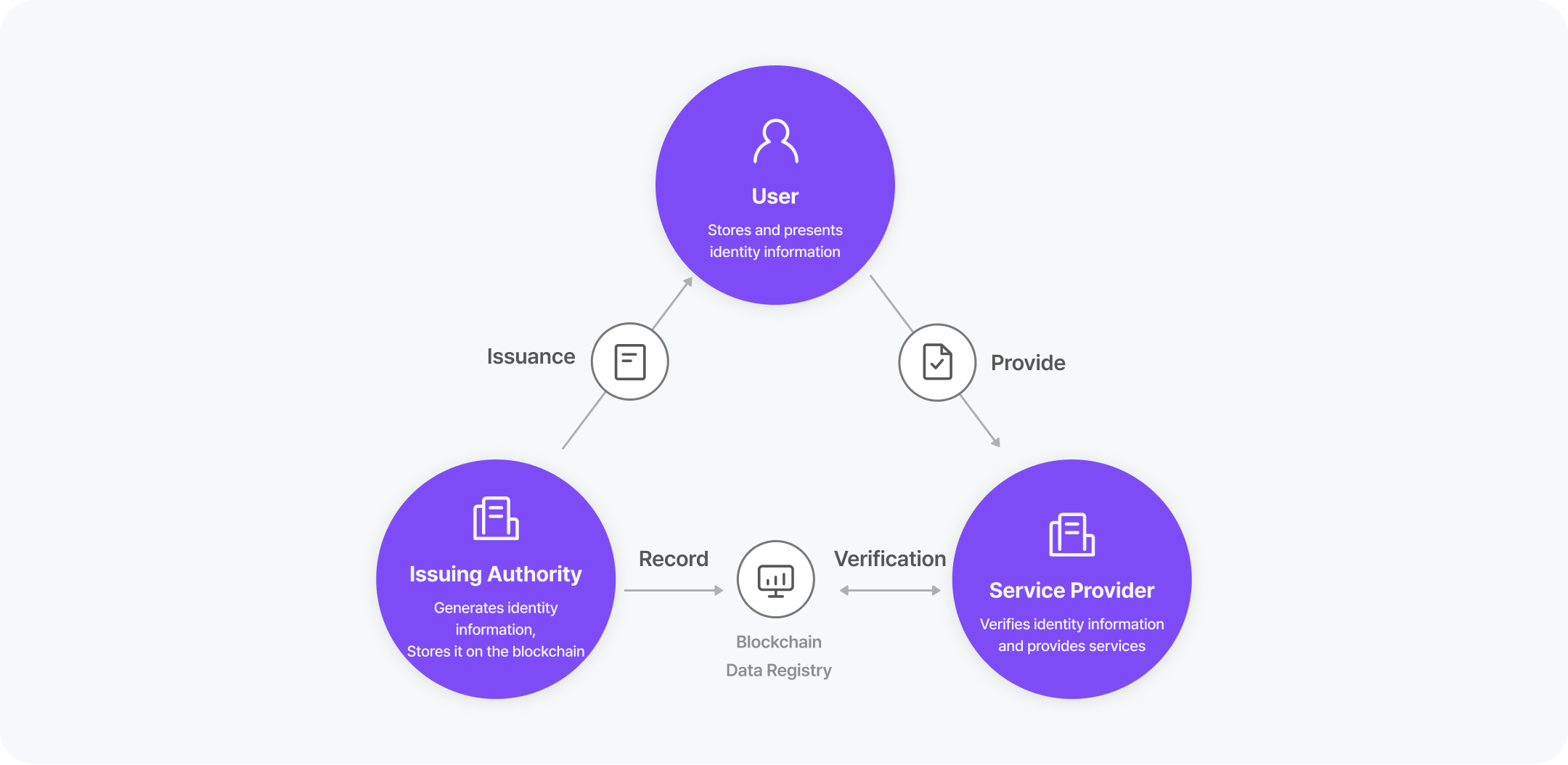
Mobile ID Service Deployment
We build optimized services for ID-issuing institutions, users, and service providers. From a mobile app designed with the best possible UX/UI, to a blockchain DID-based mobile ID issuance system for issuing institutions and verification infrastructure and integration services for service providers, we offer a complete solution for issuing and using mobile IDs. This allows issuing institutions to enhance ID reliability, users to enjoy greater convenience in mobile environments, and service providers to offer fast and secure identity verification for trusted digital services.
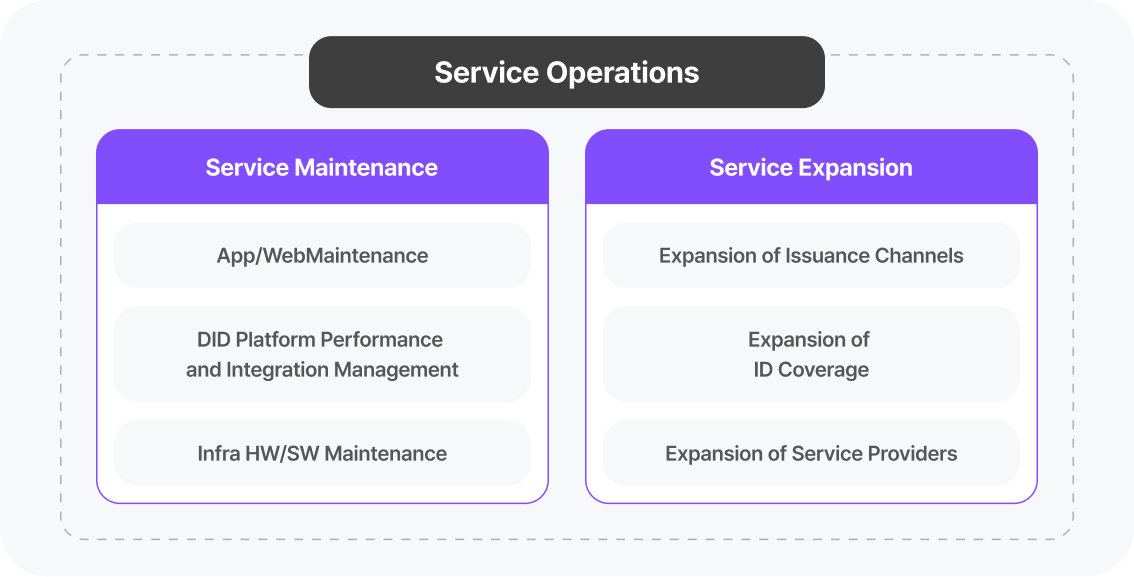
Mobile ID Service Operation
Systematic operational management is essential to ensure the stable operation and continued expansion of mobile ID services. This includes maintaining both the app and infrastructure to guarantee performance and reliability. To promote wider adoption, we also provide ongoing support for integration with service providers and encourage usage by enabling mobile ID issuance not only through the mobile ID app but also through various public and private digital wallets that meet security requirements, offering the necessary technologies and integration support.
User device apps are largely categorized into the ID app installed on a user’s device and the verification app for service providers. These apps can be conveniently used on the most commonly used devices—Android (AOS) and iPhone (iOS). The ID app is designed in the form of an intuitive digital wallet, offering a modern UX/UI optimized for user convenience and ease of use.
The mobile ID platform allows users to easily add and manage various identity credentials, such as ID cards and certificates. It provides optimal solutions that integrate both commercial and open-source technologies to ensure the stability and reliability of mobile IDs, from storing and managing issued IDs to supporting website promotion, operations, security, and integration. All members of the mobile ID ecosystem, including users, issuers, and service providers, can seamlessly use and deliver services through a single unified platform.
Issuing authorities can transition to or add mobile IDs with minimal changes by linking to the established issuance service system. LG CNS’s mobile ID service is designed to accommodate diverse users and service environments by supporting the parallel use of physical IDs (e.g., plastic cards) and mobile services. The service enhances the issuance process and integrates seamlessly with existing legacy systems and related institutions, enabling the implementation of a mobile ID issuance system without major disruptions.
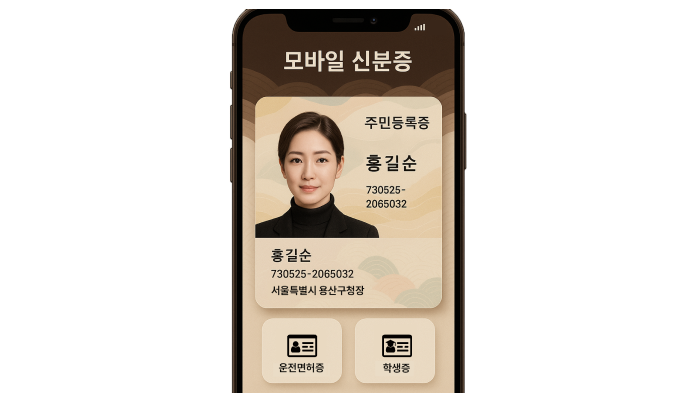
Supports the addition and use of various mobile IDs
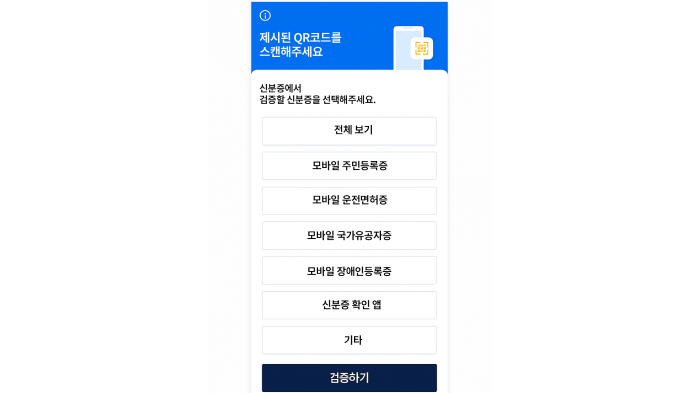
Verifies IDs by scanning presented QR codes (CPM) or generating verification QR codes (MPM)
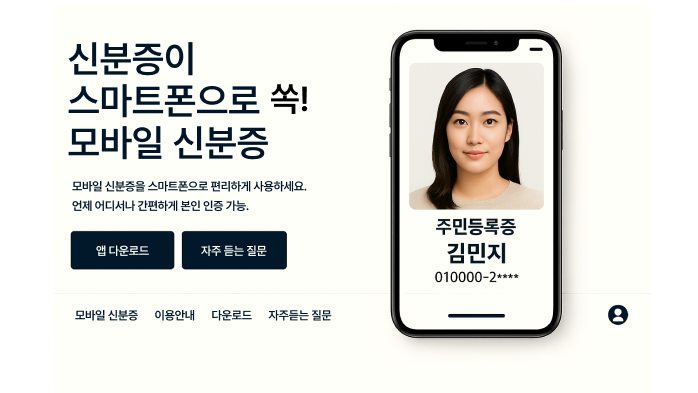
Provides mobile ID service operation details and developer resources for external integration
-
Both mobile and physical IDs can be used. In certain situations where the mobile ID may not be accessible, a physical ID based on a secure IC card can also be used. Note that mobile IDs are issued based on information from a previously issued physical ID.
-
If you lose your device, you should immediately report it to the device manufacturer or the mobile ID service center. Once the report is received, the mobile ID will be deactivated. It can be reissued on a new device or reactivated automatically if the loss report is canceled.
-
The mobile ID has the same legal validity as a physical ID and can be used in all institutions where identity verification is required, such as public institutions for online and offline civil service, financial institutions, convenience stores, and car rental services. In particular, online identity verification is gradually expanding, starting with public and financial institutions, and through private sector openings, its usage is steadily growing.
-
The mobile ID includes various anti-counterfeiting features, such as screen capture prevention and dynamic screen configuration using a gyroscope sensor. In particular, online verification cannot be counterfeited due to additional checks, such as facial recognition. However, for offline identity verification, we are expanding related infrastructure and promotion to encourage the use of QR verification through a verification app, rather than simple visual checks, which could be prone to human error.
-
The identity verification process, including the mobile ID verification app and platform, does not record or store any of the verified identity information. All personal data is securely encrypted and stored in the user's device's secure area, with only the necessary information being submitted during the verification process. IC cards and blockchain nodes do not store personal information; only the blockchain storage information and encryption keys are stored.


LG Science Park, E13/E14, 71 Magokjungang 8-ro, Gangseo-gu, Seoul, Republic of Korea
©LG CNS. All rights reserved.
LG CNS Cookies
We use cookies to provide you with a convenient web browsing
experience and to continuously improve functionality through traffic
analysis.
By clicking
‘Accept all cookies’,
you agree to our use of cookies. Click
‘Reject all cookies’
to decline all non-essential cookies. See
Privacy Policy
for details.


